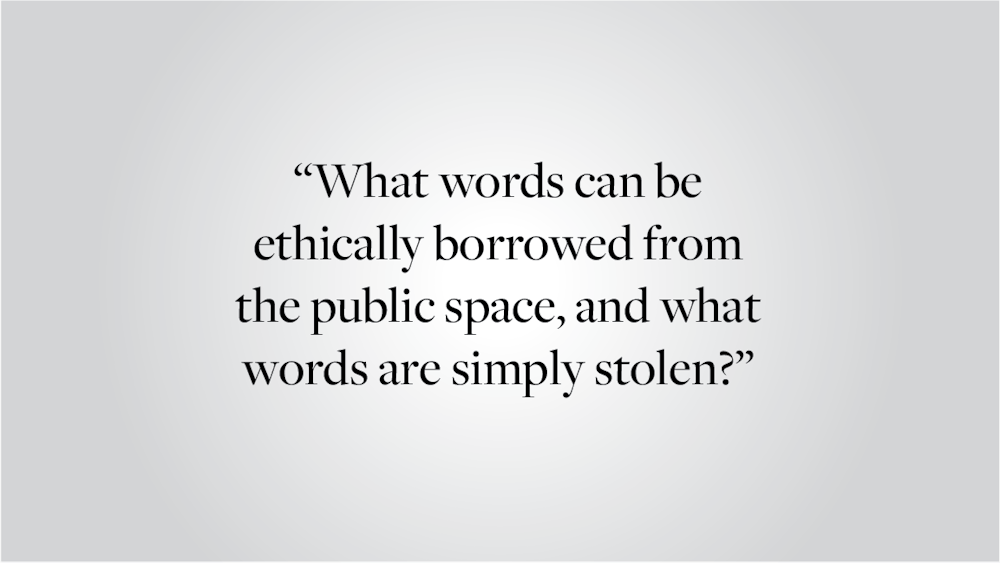“Then they set the corpses on fire. … My sister was still alive after being shot seven times. As for me, a bullet went through my left cheek. I can’t smile. My face won’t let me.”
If you found this quote disturbing, good — that was its intent. It is taken from “DMZ Colony'' by Don Mee Choi, an award-winning poetry book capturing the unseen anguish of war and colonization in Korea. The work primarily presents itself as translations of others’ accounts, interspersed with Choi’s personal experiences. The particular lines quoted above are said to come from a 10-year-old boy, referred to as Orphan Heo Jeom-dal. His story goes on for a whole page and is followed by the equally horrific accounts of several other orphaned children. At the end of the book, however, Choi reveals that she had fooled the reader all along — the stories of orphans she had “translated” were not real accounts at all, but works she’d written herself.
I read the book for a poetry class at Brown, and I’ll admit that Choi fooled me — I was thoroughly convinced she’d included real accounts from children. Before I learned the truth, I was struck by who those words belonged to. I couldn’t help but wonder if it was exploitative, rather than poetic: Was Choi taking a real child’s suffering and selling it as poetry?
She wasn’t, of course, but her work raised an important question about boundaries in poetry. As free-form poetry has become more popular, the definition of what constitutes a poem has also grown broader. One essay by writer and poet David Ebenbach even defines poetry as “a piece of writing that rewards you for reading it as though it’s a poem.” Reading “DMZ Colony,” it occurred to me that there are essentially no ethical boundaries around what we can describe as poetry. For example, if Choi had used real accounts, could we really label those people’s suffering as poetry just because we can successfully read it as such? The ethics of found poetry – poems patchworked together from words that have already been written or said – are more dubious than the poetic community seems to acknowledge.
On a personal level, I’ve always loved the concept of found poetry. In fact, I wrote my very first article for The Herald about the benefits of eavesdropping and found poetry. I championed the pastime as innocent and romantic, dismissing concerns of intrusive behavior with a quick disclaimer: It’s fine “as long as it doesn’t turn into outright violations of privacy.” But where does the line fall? What words can be ethically borrowed from the public space, and what words are simply stolen?
As it stands, there is no definitive boundary for using borrowed speech. Of course, due to copyright laws, most excerpts from published works require credit, and those over a certain length often require explicit consent. But not all speech is copyright protected in practice, and in some cases, such as overheard speech, the person whose quote is taken will never even know that it happened. Perhaps words that don’t contain information that traces back to a specific person can always be repurposed as artwork. To others, it’s only acceptable if the poet adds enough of their own spin to it.
One possible boundary is that it depends on the situation. Some thoughts, shared in passing, are very clearly okay to borrow. A while ago, an old man in front of me in a Starbucks said, “Rain is okay, rain is the way.” I don’t think he or anyone else was harmed by my scribbling it down for a future poem, or my sharing it here. Other things — like a eulogy or a story shared in confidence at a support group meeting — are clearly too personal to borrow at all, and others must be modified or used in fragments. Part of a poet's job is knowing the difference.
However, I don’t think this solution is sufficient. Allowing the writer to use their own discretion to decide what is okay to steal or how much modification is enough seems fundamentally wrong. The line is not theirs to draw — that right should belong to the speaker. Someone else’s consent is not to be assumed, even if one can do so with reasonable accuracy.
To have ethical found poetry, we must be more meticulous about obtaining explicit consent for the words we borrow, providing credit and being tactful when exposing another’s story. When we do not, the line between artwork and exploitation grows thin. This applies across artistic disciplines: “The Afghan Girl” and many other photographic works have faced controversy because their impact relies on the painful story of another without effective consent and credit. “DMZ Colony” certainly draws the reader’s attention to this threat, and my classmates and I were likely not the only ones to mistake it for expository behavior.
Poetry is an immensely powerful tool for expression. It can convey expanses of emotion and experience that prose struggles to capture in far more words. It can inspire masses, and can even save lives. So, while poets are not quite superhuman, the famous saying holds true: “With great power comes great responsibility.”
Eva Schiller ’25 can be reached at eva_schiller@brown.edu. Please send responses to this opinion to letters@browndailyherald.com and other op-eds to opinions@browndailyherald.com.





